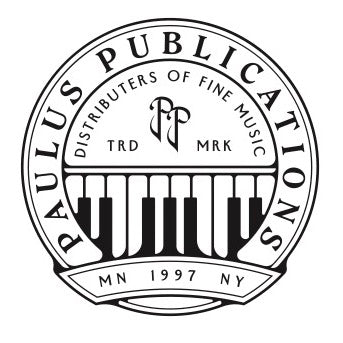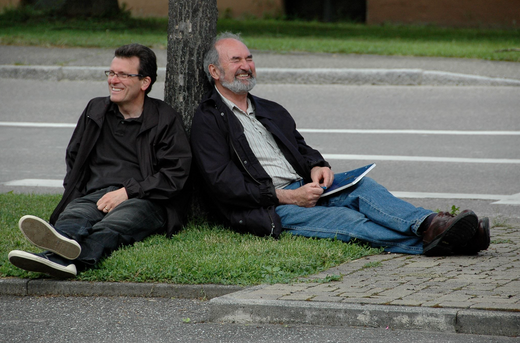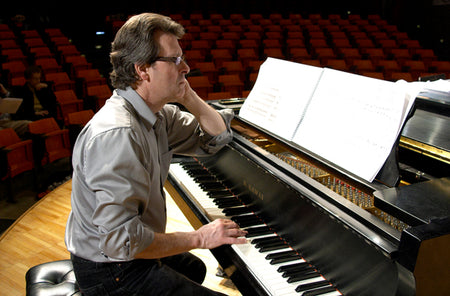This is the second in a monthly series of stories on the works of American composer Stephen Paulus. For last month's inaugural story on Pilgrims' Hymn click here. Stephen wrote a a small number of personal reflections on some of his better known works, one of which being The Road Home, which is included below.
To purchase sheet music for The Road Home you can find more information and buy digital PDFs or printed sheet music scores here.
A note from composer Stephen Paulus on The Road Home
In the Spring of 2001 I received a commission from the Dale Warland Singers to write a short "folk" type choral arrangement. I had discovered a tune in a folk song book called "The Lone Wild Bird." I fell in love with it, made a short recording and asked my good friend and colleague, Michael Dennis Browne to write new words for this tune. The tune is taken from The Southern Harmony Songbook" of 1835. It is pentatonic and that is part of its attraction. Pentatonic scales have been extant for centuries and are prevalent in almost all musical cultures throughout the world. They are universal. Michael crafted three verses and gave it the title "The Road Home." He writes so eloquently about "returning" and "coming home" after being lost or wandering. Again, this is another universal theme and it has resonated well with choirs around the world as this simple little a cappella choral piece has become another "best seller" in our Paulus Publications catalogue and now threatens to catch up with "Pilgrims' Hymn." It is just more evidence that often the most powerful and beautiful message is often a simple one.
Stephen Paulus
May 2013
A note from librettist Michael Dennis Browne on The Road Home
In the spring of 2001, Stephen received a commission from Dale Warland to write a new arrangement of an old or traditional melody, and he asked me to write the words. He played the notes for me on the piano, I recorded it, and in the following weeks played the melody over and over while I formed some words to fit its shape. When I went for walks with the dog, which was often, I sang the notes quietly to myself. (I had done something like this a couple of times before, notably with “Pilgrims’ Hymn” from The Three Hermits.)
All I knew about the tune was that it was from the Southern Harmony songbook of 1835 and that it had been performed under various titles, including “The Lone White Bird,” and that Brian Wren had written some words for it. I also knew that I found it haunting, and I welcomed the (huge) challenge to come up with words in some way worthy of it.
I did what I needed to do: spent a lot of time with the melody and tried to see what it might be trying to say. I was between visits to England, where my beloved sister Angela had become ill, and I was certainly thinking, on one level, of “the old country” which I left in 1965 to come to the United States. I could also hear in the first three notes the beginning of “Loch Lomond,” a song I had sung and loved since I was a child.
What I was looking for was a significant simplicity, something memorable and resonant and patterned, but not as complex as poems can often be, need to be; I wanted something immediate. Little by little, the words came. I thought of the speaker as a persona rather than myself, though of course there needed to be a “personal vibration” to it (to use Robert Lowell’s term). I was also trying to suggest the consolation that can come to someone of faith, in times of great stress, as a result of prayer and an abiding belief in divine mercy.
In a short essay called “Words for Music,” I have written of lyrics for music as “boats on sand” when they appear on the page. In writing words for “The Road Home,” I was writing something to be heard as many voices carrying the stirring melody and not as something self-reliant, to stand on its own the way a poem must do. In doing so, I was aware of steering close to the sentimental and, as I said in my essay, I would never present the words as a poem in a poetry reading, though I have spoken them on occasion as an example of the kind of writing I have done for music.
The song has proved popular—not quite as popular as “Pilgrims’ Hymn,” written four years earlier, though perhaps it is catching up, and has been recorded many times, with several groups using it as the title track. This is very gratifying to Stephen and myself, and for me, as a poet, it constitutes what I call “a different kind of belonging” in that it is heard in churches and concert halls and on recordings by hundreds of thousands of people, whereas my books of poems sell in very modest numbers. Poetry is my original love, and I bring to the writing of libretti and lyrics any skills and energies I may have as a poet, but it is a joy to know how this piece affects people and, in some cases, becomes a part of their lives. This is a privilege I do not underestimate and I am profoundly pleased, and honored, by this reality.
Michael Dennis Browne
September 2010
The Road Home is one of Stephen's most popular works and continues to be performed and loved by choirs and audiences all over the world. Here is The Road Home performed by Conspirare:
The Road Home
Tell me, where is the road
I can call my own,
That I left, that I lost,
So long ago?
All these years I have wandered,
Oh, when will I know
There's a way, there's a road
That will lead me home?
After wind, after rain,
When the dark is done.
As I wake from a dream
In the gold of day,
Through the air there's a calling
From far away,
There's a voice I can hear
That will lead me home.
Rise up, follow me,
Come away, is the call,
With the love in your heart
As the only song;
There is no such beauty
As where you belong:
Rise up, follow me,
I will lead you home.
Here is Stephen's handwritten manuscript for the SSAA version.



If you are interested in learning more about The Road Home or purchasing scores in SATB, SSAA or SSAA voicing you can find more information and buy digital or printed sheet music scores here.



